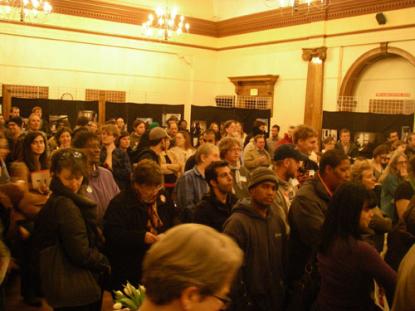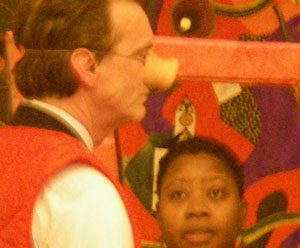One of the perks of my job is attending programs that have been funded by Mass Humanities. I wish I could attend them all. We support an incredible smorgasbord of projects, which have in common only that they are public humanities programs in or about Massachusetts. One of the rich forms of community humanities is the oral history and photography project. Two are in process right now.
If I had time I’d be on my way to Ipswich right this minute, for a brown bag lunch that is part of People and Place, which was announced in the Salem News as “History in the first Person.” Trying to understand their town better, Lucy Meyers and Terri Unger are interviewing and photographing Ipswich elders of all stripes. At today’s event, some of the photographs will be on exhibit, and project humanities scholars and residents will reflect on the role of the Ipswich River in the town’s (natural) history, development, and life. At the end of the process of discovery, the project will become a book.
Though I know there will be many people getting a dose of good humanities at the Ipswich Museum today, I am sorry to miss the “here and now” of the meeting, the face to face experience, central to civic society, that Mass Humanities, stands for. My frustration at not being able to attend many of the events we fund typifies the dilemma of the working adult. Getting people to make time in their busy schedules and go to an event is one of the most difficult things we and our grantees do. Events like these are usually well attended, however, aided by built-in interest and the bush telegraph that characterizes a functioning community.
 I recently attended another oral history and photography event, the opening of the We Shall Not be Moved: photographs and oral histories from the Bank Tenants Association exhibit at the Great Hall, Codman Square, Dorchester. It was attended by an enthusiastic crowd of some 150 people (my estimation). The project’s main product is a Web site, but project director and documentarian Kelly Creedon has also organized a series of exhibits and programs, and this was the first.
I recently attended another oral history and photography event, the opening of the We Shall Not be Moved: photographs and oral histories from the Bank Tenants Association exhibit at the Great Hall, Codman Square, Dorchester. It was attended by an enthusiastic crowd of some 150 people (my estimation). The project’s main product is a Web site, but project director and documentarian Kelly Creedon has also organized a series of exhibits and programs, and this was the first.
A little bit about the project: We Shall Not be Moved documents the activities of the Bank Tenants Association (BTA), an organization that battles foreclosure and eviction in Boston through documenting the lives of some of its members. The BTA is a grassroots campaign of City Life/Vida Urbana, a fair housing advocacy nonprofit, which was called into life when the foreclosure and eviction rate of the current mortgage crisis started to take on disastrous proportions in Dorchester and Roxbury.
When Kelly Creedon first approached me about funding, I hemmed and hawed about the project’s eligibility for a humanities grant: though we are committed to taking on community projects, and we want to bring humanities to underserved populations, we do not fund advocacy, political or otherwise. In a good humanities project, the conclusions are not foregone. The line is not always clear, however, when telling the lives of “We the People” includes documenting disenfranchisement or exploitation. But that doesn’t mean we should shy away: on the contrary, humanities scholarship can bring incredible insights to difficult topics. I worked with Creedon to bring that humanities content to the project, as I had worked with the Ipswich project to incorporate humanities scholarship and community participation.
We Shall not Be Moved is one of those projects that surprises and enlightens almost everyone who hears about it or sees it. Yet, thanks to extensive and ongoing national press coverage, we tend to think we “know” the mortgage and foreclosure crisis. What does this project add to the information already out there that makes it so compelling?
Kelly Creedon’s images of people in and in front of their foreclosed homes are almost ordinary. And this is exactly the point. We have emptied the image we have of the crisis in the same way we emptied the American West of inhabitants in the nineteenth century: boarded over homes, signs on desiccated lawns, nary a person in sight, rows and rows of dreary and cheaply-built sameness, in the corner of a fenced in yard an old newspaper drifting. Very photogenic in a Dust Bowl sort of way.
Here, instead, we have the face of foreclosure in Boston neighborhoods: people with stories, jobs, children, pets, dreams, and the kind of disasters that make up life. People who have plants in their houses and paint the bathroom on a weekend. The stories aren’t perfect, not everyone is a “good” victim, a “deserving” case of poverty or of justice undone. In fact, as some feel compelled to point out in detail, the stories of the dashed hopes and dreams do not exactly reflect the harsh literal realities of today’s finance, of what we “owe” the bank or the insurance companies after disaster has hit our lives. (See Comment by “real estate analyst” Boston Globe, February 20, 2011.)
What we do have, however, as Creedon points out on the panels accompanying the photos and recordings and with the help of her humanities scholars are numbers that align to show a pattern of conscious exploitation, an image of how much we as a people once did care legislatively about what happens to our fellow citizens as they lose jobs and houses, an understanding of how much national horror stories hide local stories that don’t quite hit the same extreme low notes.
As Creedon photographs and interviews members of the Bank Tenants Association, gives interviews, gives exposure to a movement that aims to keep people in their houses after foreclosure, she points out what we also have: a society in which good rental housing is more expensive than complex mortgage products that hide their real costs; in which owning real estate is almost universally understood as one sure road to respectability and financial stability; in which automatic eviction upon foreclosure, whether it makes financial sense for the bank or not, sends hundreds and thousands of lives a-reeling for not much of a reason whatsoever.
The opening I attended, however, was not only about Kelly Creedon’s documenting the Bank Tenants Association, but an introduction to the BTA’s ways of recruiting people and getting them to find their voices and stand up to the banks together. In recruiting people who are wary of “help,” and winning over banks thatlook at the letter of the contract, they use testimony, skits, demonstrations, and legal action. And so it was here. Members came out and testified about their own experience, a skit pitted pig-nosed “bankers” against unwitting home owners and tenants, politicians said they were behind it and this was the “place to be” in Dorchester this evening.
and stand up to the banks together. In recruiting people who are wary of “help,” and winning over banks thatlook at the letter of the contract, they use testimony, skits, demonstrations, and legal action. And so it was here. Members came out and testified about their own experience, a skit pitted pig-nosed “bankers” against unwitting home owners and tenants, politicians said they were behind it and this was the “place to be” in Dorchester this evening.
All in all, the event was more of a consciousness-raising-cum-social justice happening than a traditional humanities event—even if it was oral history in the flesh. UMass urban anthropologist Tim Sieber was there but did not give a humanities lecture or anything like that. Yet, the event was wonderful and effective. The humanities did not need to be weighed in lecture/hours per photograph or scholar/pounds per participant.
A solid humanities project forces the participants/viewers/attendants to rethink their assumptions, whatever they may be, and in doing so opens up lines of communication rather than stakes out a position. It sets down a challenge that cannot be dismissed. The humanities themes of this project, at times implicit, confront us with our assumptions about home ownership and foreclosure, success and failure, and the relationship between commerce and community.
If such themes were used explicitly, to organize the project, they would need to be taken on in their larger entities, rather than countered with debunkings of the specifics. Such an approach would provide the kind of challenge to our knee-jerk understanding of how the world works that is the unique service of the humanities.
This is the best interview with Kelly Creedon:
WBUR’s Radio Boston: Facing Foreclosure, Residents Say ‘We Shall Not Be Moved’ (click on “listen now” rather than on the video)
http://www.boston.com/yourtown/news/dorchester/2011/02/city_lifevida_urbana_celebrate.html
other press:
Boston Globe: Showing the struggle that follows foreclosure
Boston.com: City Life/Vida Urbana celebrates accomplishments at “We Shall Not Be Moved” exhibition
NPR’s Morning Edition: ‘We Shall Not Be Moved’: Stories Of Fighting Eviction In Boston
Boston Herald: Exhibit eyes foreclosure crisis
Universal Hub: Project documents Boston’s foreclosure crisis, one victim at a time
Dorchester Reporter: Documentary puts a vivid face on foreclosures
Places to see the exhibit:
- March 3-30 @Washington Street Art Center, 321 Washington Street, Somerville, MA 02143
- April @ Julia Richman Education Complex Gallery, 317 East 67th Street, New York, NY 10065 Opening reception: Thursday, April 7, 5 to 7 pm


